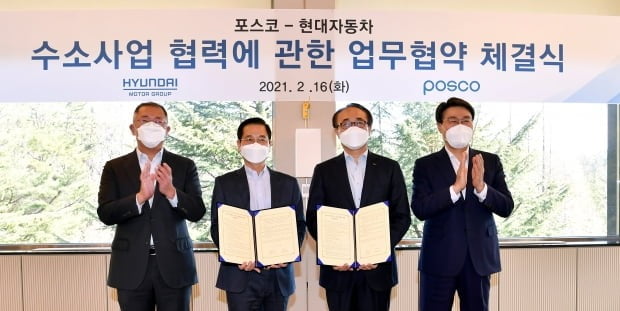
Photo = Yonhap News
Hyundai Motor Group and POSCO Group will cooperate in developing hydrogen reduction steel technology that uses hydrogen instead of coal as a material for steel production. The goal is to achieve carbon neutrality early by completely removing carbon from the process of producing steel materials used by Hyundai Motors such as automotive steel plates.
According to the steel industry on the 22nd, Hyundai Motor Group Chairman Eui-sun Eui-sun and POSCO Group Chairman Jeong-woo Choi met at the’Business Agreement on Hydrogen Business Cooperation’ held at the POSCO Guest House in Pohang, Gyeongbuk on the 16th to gather their opinions. The two companies plan to continue cooperation while participating in each national project related to the hydrogen industry.
Hydrogen reduction steel technology is a method of using hydrogen instead of coal as a reducing agent required in the steel smelting process. It is an eco-friendly technology that does not emit greenhouse gas. To produce 1 ton of steel using the conventional method, 0.75 ton of coal is required. In this process, about 2 tons of carbon dioxide is released. This is why the steel industry is called a representative carbon emission industry.
Hyundai Motor Group and POSCO decided to use’Green Hydrogen’. Since green hydrogen is produced using renewable energy such as hydropower, wind power, and solar power, it does not generate carbon dioxide even in the process of making hydrogen.
Hydrogen reduction steel technology can significantly increase the amount of hydrogen used and accelerate the entry into the hydrogen economy. If this technology is applied to POSCO and Hyundai Steel, 5 million tons of hydrogen per year are required. An industry insider pointed out, “It is a future eco-friendly technology that can change the paradigm of the steel industry.”
Hyundai Motor and POSCO’Hydrogen Alliance’… US-EU’Carbon Neutral Barrier’ Response
“Enormous development cost… desperate for government support”
The hydrogen reduction method that Hyundai Motor Group and POSCO Group decided to develop in cooperation is completely different from that of existing furnaces and electric furnaces. The furnace makes pure iron by putting iron ore (iron oxide) and coal (reducing agent) and melting it with high heat. High-quality iron can be made in large quantities, but it has a negative impact on the environment, such as emitting a large amount of carbon dioxide. An electric furnace makes molten iron by melting iron scrap (agglomeration of scrap metal) with electricity. It is being criticized for being far from carbon neutral because it uses a large amount of electricity.
The hydrogen reduction steelworks prepared by the two companies use green hydrogen as a reducing agent, so they do not emit carbon at all in the process of making molten water. It is known that in order to apply this technology, a new steel mill must be built. After the technology development, Hyundai Steel’s Dangjin Works and POSCO’s Pohang and Gwangyang Works are expected to be converted into hydrogen reduction steelworks in stages. It is known that a plan to build a separate hydrogen steel mill in a third area is also being discussed.
The reason why Hyundai Motor Group and POSCO Group, which were competing in the steel industry, joined hands because major countries such as Korea, the United States, and the European Union (EU) are vigorously promoting carbon neutral policies. If you don’t meet the standards set by each government, you may pay huge taxes or you may not be able to sell your products at all. This means that if the hydrogen reduction steel technology is not secured in a timely manner, the company could be hit hard.
An industry insider explained, “Some global steelmakers may be forced to close their doors because of their carbon-neutral policy. There is also an aspect that Hyundai Motor Group and POSCO Group chose to cooperate to reduce the enormous investment burden.”
It is pointed out that the industry needs policy support at the national level. Hydrogen is more expensive than coal, and technologies related to transportation and production are in full swing. This means that it is difficult to obtain a stable supply at an affordable price. Industry experts have observed that steel products using hydrogen as a reducing agent will be more expensive than existing products.
An industry insider explained, “It is important to secure infrastructure related to production, transportation, and storage,” and said, “There are limitations in establishing infrastructure for individual companies.” There are also opinions that the government should support R&D by companies.
Reporter Do Byeong-wook [email protected]
